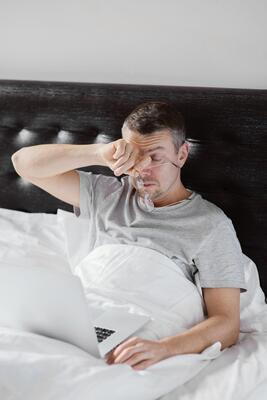
Millions of people around the world suffer from sleep apnea, but it's often overlooked. Even more surprising is the fact that there is a strong link between this sleep disorder and oral health. Let us help you understand what sleep apnea is and how it is related to oral health.
What is Sleep Apnea?
Sleep apnea is a sleep disorder. During sleep apnea, there are frequent pauses in breathing during sleep. These pauses are called apneas and can last for a few seconds or even minutes and happen dozens of times per hour. Because of this, it is difficult to get a good night's sleep, which usually leaves one feeling sleepy, agitated, and unwell the next day.
The three main types of sleep apnea are as follows:
Obstructive Sleep Apnea (OSA):
This is the most common kind of sleep apnea and happens when the muscles at the back of the throat relax too much, obstructing the airway.
Central Sleep Apnea:
This less common type occurs when the brain fails to properly signal the muscles that control breathing.
Complex Sleep Apnea Syndrome:
This combination of obstructive and central sleep apnea is also known as treatment-emergent central sleep apnea.
Now, let's look into the fascinating connection between oral health and sleep apnea.
The Link between Sleep Apnea and Oral Health
You might be surprised to learn that a sleep apnea diagnosis could be made by your dentist. The connection between these two seemingly unrelated issues is as follows:
Oral Anatomy:
The anatomy of your mouth and throat is very important in the development of sleep apnea. Obstructive sleep apnea can be caused by a narrow airway, enlarged tonsils, a large tongue, or a deviated septum. These problems can be found by dentists during routine check-ups.
Teeth Grinding (Bruxism):
Bruxism, a condition where people with sleep apnea frequently grind their teeth at night, is common. Dental issues like chipped teeth, jaw pain, and headaches can result from grinding.
Dry Mouth:
Dry mouth can result from mouth breathing, which is common in people with sleep apnea. Because saliva is necessary for preventing tooth decay, a lack of it can lead to dental problems.
Surgical Solutions for Sleep Apnea and Oral Health
Given that sleep apnea and oral health are related, let us look at some surgical treatments that can reduce sleep apnea symptoms and enhance oral health:
Uvulopalatopharyngoplasty (UPPP):
This surgical procedure removes excess tissue from the throat and palate to widen the airway. It's often recommended for those with obstructive sleep apnea.
Genioglossus Advancement (GA):
GA moves the tongue to avoid obstructing the airway while you sleep.
Maxillomandibular Advancement (MMA):
MMA is a successful treatment for some cases of sleep apnea because it involves moving the upper and lower jaws to widen the airway.
Oral Appliances:
Dentists can also fit their patients with oral appliances, like mandibular advancement tools, to help realign the jaw and maintain an open airway while they sleep.
If you have sleep apnea or are in doubt that you might have it, there is a chance your dentist can help you diagnose it and find treatment for it too. So next time you go to your dentist, tell them about any issues you are having and let them check what can be done.
